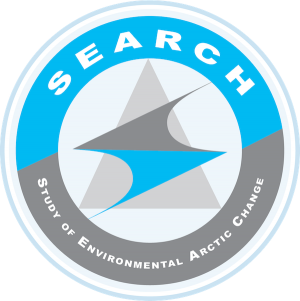By: Brendan P. Kelly, SEARCH Executive Director
The Study of Environmental Arctic Change (SEARCH) facilitates synthesis of Arctic science and communicates our current understanding to help society respond to a rapidly changing Arctic. We focus our syntheses on the changing cryosphere (permafrost, land ice, and sea ice) and the consequences for ecosystems and society. We communicate our understanding to multiple audiences but with an emphasis on policymakers. Synthesizing and communicating to non-scientists both are acts of translation—across disciplinary languages in the case of synthesis and from technical to non-technical language in the case of conversing with policymakers.
A recent example of translating across disciplines was the International Workshop to Reconcile Methane Budgets in the Northern Permafrost Region (https://eos.org/meeting-reports/resolving-a-methane-mystery-in-the-arct…). SEARCH brought together over 40 international scientists with expertise ranging from atmospheric chemistry to oceanography to ecology. Translating across discipline-specific vocabularies was essential to understanding mismatches in estimates of methane emissions from permafrost based on field measurements and on atmospheric data. The common understanding established in the workshop allowed the researchers from different disciplines to create a collaborative plan to reconcile the divergent estimates.
While it is possible to corral scientists for three-day technical workshops, opportunities to communicate with policymakers typically depend on shorter convenings. Hence, SEARCH produces short, written briefs addressing policy-relevant questions about Arctic change (https://www.arcus.org/search-program/arctic-answers). Those "Arctic Answers" informed a series of recent in-person policy briefings in Alaska;1 other states;2, Washington, DC; 4, 5,6 and abroad. 7, 8 The production of the briefs was enhanced by collaboration with Congressional staff who provided guidance and feedback. In response to the briefs. SEARCH was invited to brief the Senate Arctic and Ocean caucuses on 26 September 2017. Over 30 participants represented both caucuses; three other Senate committees; 9 members' offices; the Navy's Oceanography, Space and Maritime Domain Awareness Directorate; and the Bureau of Ocean Energy Management. SEARCH followed up with visits to the offices of 9 members of Congress in September and October. Those meetings were collaborative, two-way exchanges in which SEARCH was able to convey up-to-date scientific information, and the congressional staff shared suggestions for increasing our effectiveness in addressing policy. One of SEARCH's leaders is fond of saying, "the science is not complete until the paper is published" to which another adds, "….and the science is made available to stakeholders" including policymakers.
Further information about SEARCH Action Teams and related products is available on the SEARCH website.
Or, contact Brendan P. Kelly, SEARCH Executive Director (bpkelly [at] alaska.edu).
Footnotes
1Alaska Center for Climate Assessment and Policy: https://accap.uaf.edu/SEARCH_Arctic_Answers
2 Arctic Encounter Symposium:
3 Middlebury Institute of International Studies:
4 Woodrow Wilson Center:
https://www.wilsoncenter.org/event/arctic-environmental-futures-nexus-s…
5 American Association for the Advancement of Science:
https://www.facebook.com/ArcticChange/videos/353317338412791/
6 Geopolitics in the New Frontier: Opportunities and Challenges in the Arctic:
https://isd.georgetown.edu/
7 The Arctic at the Crossroads: cooperation or competition?:
http://www.ditchley.co.uk/conferences/past-programme/2010-2019/2017/arc…
8 Arctic Science Summit Week:
https://www.czech-in.org/cmgateway/assw17/index.html?module=searchablep…
